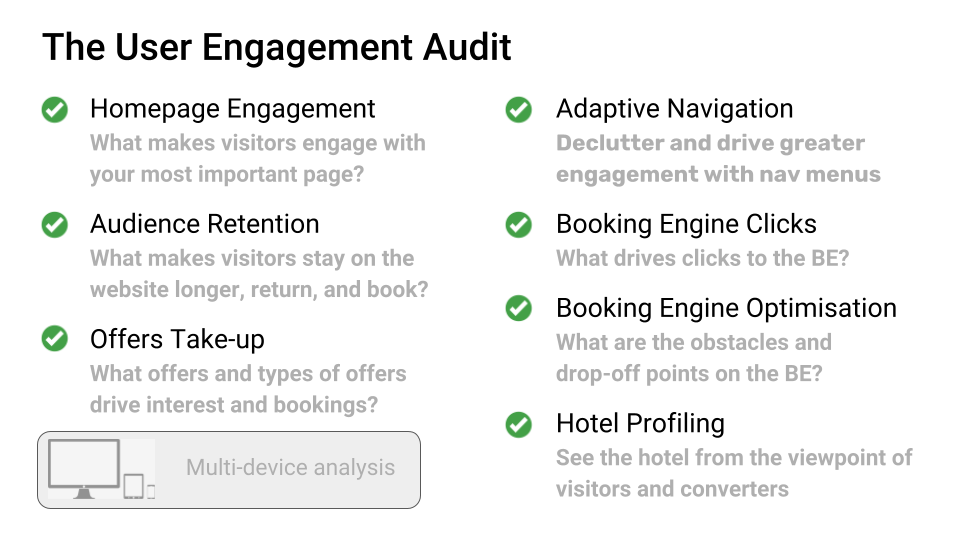As a hotel marketing manager, you understand the importance of having a strong online presence to attract and retain guests.
A hotel website is often the first point of contact between a potential guest and your property, so it’s critical that it’s engaging, user-friendly, and optimized for bookings. However, creating a website that meets all these requirements is easier said than done.
This is where a User Engagement Audit for Hotel Websites can help.
This audit analyzes the user behaviour on your website to identify friction points and provides actionable insights for improving the user experience.

The User Engagement Audit
Remove the friction.
Bring in the bookings.
Let’s take a closer look at the seven elements of the audit and why they’re important:
- Homepage Engagement
The homepage is the most important page on your website, as it’s often the first page visitors see. The audit examines what elements on your homepage engage visitors and what can be improved to encourage them to explore your site further. - Audience Retention
Keeping visitors on your website for longer and encouraging them to return is key to building a loyal customer base. The audit examines what keeps visitors on your website and what can be improved to increase their chances of returning. - Offers Take-up
Offering the right types of deals and promotions can be a powerful tool for driving interest and bookings. The audit examines the most effective offers and how they can be optimized for maximum impact. - Adaptive Navigation
A cluttered and confusing navigation menu can be a major turnoff for visitors. The audit examines how navigation menus can be decluttered and improved to increase engagement and make it easier for visitors to find what they want. - Booking Engine Clicks
Getting visitors to click through to your booking engine is critical for converting them into customers. The audit examines what elements on your website are driving clicks to the booking engine and what can be improved to increase conversion rates. - Booking Engine Optimization
Once visitors reach your booking engine, making the booking process as smooth and straightforward as possible is important. The audit examines what obstacles and drop-off points prevent visitors from completing their bookings and how they can be overcome. - Hotel Profiling
Finally, the audit takes a step back and looks at your hotel from the viewpoint of visitors and converters. This provides a valuable perspective on how your website is perceived and how it can be improved to meet the needs of your guests better.
In conclusion, auditing your hotel website for improved user engagement is critical in optimizing your online presence and driving more bookings. By identifying friction points and providing actionable insights for improvement, a User Engagement Audit can help you create a website that meets the needs of your guests and sets you apart from the competition.

The User Engagement Audit
Remove the friction.
Bring in the bookings.
